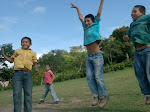
Community Based Learning
the experience of
Arte Acción Copán Ruinas, Honduras
For four years in a row, Arte Acción Copán Ruinas (a NGO that organizes cultural activities for young adults and children in Honduras) received students of Huron University College, from 2004-2007.
Although initially hesitant about working with a group of twelve inexperienced volunteers, the partnership has been very successful. Throughout the years, and in close collaboration with the Huron students, we have developed a format that is satisfying for all parties involved: the Huron students and professor(s), our organization and the Honduran children the students worked with.
Providing a Community Based Learning experience is not easy. All too often foreign visitors, students or volunteers are merely observers in a totally different culture, trying to apply their own experiences and values in places and situations where this might not always work. As for the receiving party, Hondurans sometimes tend to modify their behaviour to the expectations of the visitors. In order to really experience another culture, it is necessary to become part of it, and the easiest way to do so (when there’s only a short period of time) is becoming part of the daily routine, by having a job to do.
The Huron students that volunteered with our organization all conducted different kinds of workshops at rural schools. The first few years we tried to offer a program as varied as possible, but we soon found out that neither the students, nor the local children benefited to the maximum from this format. Instead, we decided to work in only three rural communities where the students taught during a 2,5 week period, in groups of max. four students. This way the students were able to build relationships with the children they worked with; to get to know the community they worked in and to understand from first hand experience the problems the locals have to deal with (lack of access, water, electricity etc.). By the end of the 2,5 weeks we organized a festive encounter between the three schools. Last year we had about 250 people present during this terrific final event. It was especially endearing to see how proud the children felt of their “own” community” and their own ”gringos”,
In our relationship with Huron, we, as in representatives of Arte Acción Copán Ruinas, have always stated clearly that our main goal is not to provide the Canadian students with a great learning experience, but our own, the children of the rural communities the students worked in. Whereas it is the Huron’s professors’ responsibility to ensure an interesting experience for the Canadian students, it is our duty that the local children benefit from the visit in a constructive way. We have been able to achieve this because the children clearly benefit not only from participating in the workshops and learning new things, but also from building relationships with “gringos” during an extended period of time. The relationship between the Huron students and local children is based on equality, friendship, respect and a mutual eagerness to learn from each other and not on the exchange of materialistic goods. This is a healthy relationship that can be used as a base on which to develop many a project.
Another important factor in the success of the mutual learning experience is the continuity of the projects, as we experienced during the last two years Huron students worked with our organization. By working in the same communities year after year, the partnership only becomes stronger. The Huron students will understand better what to expect from the experiences of previous visits and the local children will look forward to the visit of “Los Canadienses”. Unfortunately, this continuity was interrupted last year, but we hope to be able to continue working together in the future on a yearly basis, because it seems to be the perfect period of time to develop such projects and also to strengthen the relationships between Huron and the selected communities which might result in sustainable help for the children and their families. This has happened regularly so far: we still receive donations from Huron’s ex-volunteers to buy supplies for a school, or a certain family in need.
As for our own organization, we made new friends through Huron and are still in touch with many of them. Twice, we received long-term volunteers (3 months) who had visited us previously as Huron student volunteers. Besides the obvious and direct benefits our organization receives (donation of art supplies and educational materials, number of workshops and activities developed by the volunteers, cash contributions) we feel that the Huron experience has helped us to develop a format for volunteer work that functions really will for all partiers involved, and not only for volunteers from Huron.
The only remark left is that personally I’d love to see more of a cultural exchange, that is, a learning experience for both cultures about both cultures. After learning more about Canada’s First Nation communities, I was amazed by the similarities between the Honduran Maya Chortí and indigenous people in Canada, especially in the problems they face. I think the experience in Canada can be very helpful for the Honduran indigenous people, if only for the recognition of aspects of each other’s cultures and the similar problems.
Carin Steen
Copán Ruinas, Honduras, 12-10-8




.jpg)
